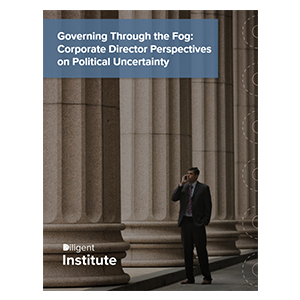The following blog series was excerpted/summarized from the latest Diligent Institute report, Governing Through the Fog: Corporate Director Perspectives on Political Uncertainty. The Diligent Institute is a separate think tank and research arm that tackles governance issues through a global lens. For more information and research from the Diligent Institute, please visit the website.
- 3 Trends Driving Political Uncertainty in Today’s Boardrooms
- How Does Political Uncertainty Differ from Other Board-Level Risks?
- How Today’s Boards Are Overseeing Political Uncertainty
________________________________________
Is Political Uncertainty Different from Other Kinds of Risks?
Risk oversight is a core area of the board’s responsibility. Boards have highly sophisticated ways of evaluating the risks facing their organizations, and they use those evaluations to make critical decisions for the organization. In the first blog of this series, we discussed the unique nature of political uncertainty — and various trends contributing to its complexity. How does political risk fit into existing enterprise risk management frameworks? Do existing frameworks allow boards to sufficiently address these issues? Or, should boards approach political uncertainty within a different context?
A Consistent Approach to Handling the Risk of Inconsistency
Some directors argue that political risk can fit into a board’s standard risk management process. One director articulated it well: “My view is that none of those categories of risk are really different. Yes, the details are different, [but] the process that you go through to try to understand it, define what level of risk you want to take or are willing to accept, and then develop plans to mitigate the risk [is the same]. That process and structure applies to all risks, including political uncertainty.” Another director agreed by saying: “I’m not too sure it is different from other forms of enterprise risk management. It’s all about planning and understanding your risk. Plan as if the worst is going to happen, and then hope to hell that it doesn’t.”
“From the perspective of enterprise risk management, political risk has risen in almost all of my companies to number one. Political risk is much less predictable, much less subject to management, and much more prevalent. It’s policy by tweet.”
– Board Member, “Governing Through the Fog” report
However, other directors see significant differences between other areas of risk and political uncertainty. One director who has both public and private board experience commented that boards are less well-equipped to handle these kinds of issues: “Political risk management requires a narrower set of skills and experience that board members will probably be less likely to have themselves, depending on their background, and be more driven therefore to make sure that there is enough of that experience either on the management team or advisors.”
Boards Have Few Good Options for Handling Political Risk
Directors also observed that political risk is unique because directors have substantially fewer options for how to respond to it. A director put it bluntly, “Political uncertainty is very different from other risk areas. For cyber risk, for example, you can throw people and money at the problem, and that will do something to make sure you’re protected. Political risk is by its nature intangible, and throwing money at it [amounts to] bribery.” One director provided another example of this difference: “If political uncertainty has a huge impact on the potential market for the output of the capital you’re going to spend, then you’re going to be much more cautious about spending it than if the uncertainty is around availability of materials, or the building of a plant, or something or something like that. For those risks, you can plan, you can mitigate; you can model delays and determine the impact that they’ll have.”
“For most other risks around how you spend capital, there are many more tools available to mitigate the risk than with political uncertainty. For other risks, you can purchase insurance.”
– Board Member, “Governing Through the Fog” report
The impact is even more pronounced for smaller companies, as one director explained, “Bigger companies have a lot more cushion and can look more long term. A smaller company doesn’t have the strength to make big investments with a 10 to 20 year time horizon – a smaller company needs to make an investment in something that will have a return in 1 to 2 years.”
“Any time a business is making capital decisions and human capital decisions, in a world of less stability, it means a little less gas and a little more brake. To me, it’s a little like when you’re out in traffic, something happens on the other side of the road. First, pull your foot off the gas and look. One or two people tap the brakes. After that reaction, traffic isn’t as smooth anymore. Those are the dangers that political instability and volatility bring to the economic context. Companies don’t have the valve quite as wide-open on deploying capital and hiring people.”
– Board Member, “Governing Through the Fog” report
Political Uncertainty Risk Is Difficult to Measure
Political risk presents a different kind of risk because it’s a lot harder to measure. As discussed above, the pervasiveness of political issues bleeds into a wide array of business decisions makes measuring its impact particularly challenging. As one director pointed out, “political uncertainty is touching everything,” which makes it hard to track cause and effect cleanly. In managing risk, measurement is key to determining which approaches have the best outcomes.
Additionally, several directors pointed out that political and economic uncertainty are closely tied together. For example, some directors, like this US-based one, voiced concerns that a popular perception of political instability might impact the overall health of consumerism: “People are effected every day by political uncertainty, and its impact as well as the impact of geopolitical issues on conscious and even unconscious minds is hard to measure but really significant. When people feel good, when people feel optimistic, they go shopping. I’ve been in consumer goods businesses for a long time, and I know the effect is real.”





